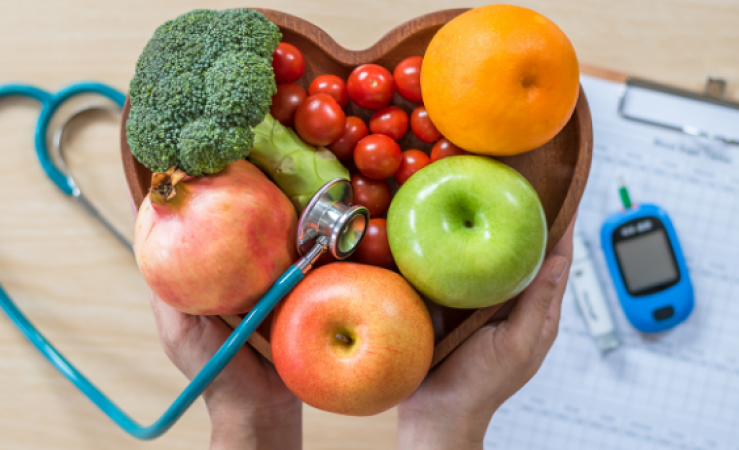
High cholesterol levels can significantly increase the risk of heart disease and other cardiovascular problems. However, there are several natural and effective ways to lower cholesterol levels without relying solely on medication. In this article, we will explore ten lifestyle changes and dietary habits that can help you reduce cholesterol levels and promote heart health, enabling you to lead a healthier and happier life.
10 Effective Tips to Reduce Cholesterol Naturally -
Adopt a Heart-Healthy Diet - Switch to a heart-healthy diet that emphasizes whole foods and minimizes saturated fats and trans fats. Incorporate fruits, vegetables, whole grains, nuts, and seeds into your daily meals. Opt for lean proteins like fish, chicken, and legumes. Avoid processed and fried foods, as they can raise cholesterol levels. Instead, cook with healthy oils like olive oil or avocado oil, which are rich in monounsaturated fats that can help lower LDL cholesterol levels.
Increase Soluble Fiber Intake - Include more soluble fiber in your diet as it can effectively lower LDL cholesterol levels. Foods like oats, barley, beans, lentils, fruits (especially apples, citrus fruits, and berries), and vegetables are excellent sources of soluble fiber. This type of fiber binds to cholesterol in the digestive tract, preventing its absorption and promoting its elimination from the body. Aim to consume at least 5-10 grams of soluble fiber per day to reap its cholesterol-lowering benefits.
Regular Physical Activity - Engage in regular physical activity to improve your cholesterol profile. Aerobic exercises like brisk walking, jogging, swimming, and cycling can help raise HDL (good) cholesterol levels while lowering LDL (bad) cholesterol levels. Aim for at least 150 minutes of moderate-intensity exercise or 75 minutes of vigorous-intensity exercise per week. Combining aerobic activities with strength training can also improve overall cardiovascular health.
Limit Alcohol Consumption - Moderate alcohol consumption might have some cardiovascular benefits, but excessive intake can raise cholesterol levels and contribute to other health issues. If you drink alcohol, limit it to one drink per day for women and up to two drinks per day for men. However, it is essential to consult with your healthcare provider to determine if alcohol is safe for you based on your health status.
Quit Smoking - Smoking not only damages the blood vessels and increases the risk of heart disease but can also lower HDL cholesterol levels. Quitting smoking can lead to significant improvements in your cholesterol levels and overall cardiovascular health. Seek support from healthcare professionals, friends, and family, or join smoking cessation programs to successfully quit this harmful habit.
Consume Omega-3 Fatty Acids - Omega-3 fatty acids, found in fatty fish like salmon, mackerel, and sardines, have been shown to reduce triglyceride levels and lower the risk of heart disease. If you don't consume fish, consider plant-based sources of omega-3s, such as flaxseeds, chia seeds, and walnuts. Alternatively, you can take omega-3 supplements after consulting with your doctor to ensure the appropriate dosage for your needs.
Manage Stress - Chronic stress can influence cholesterol levels and contribute to heart disease risk. Practice stress-reducing techniques such as meditation, yoga, deep breathing exercises, or spending time in nature to calm your mind and body. Engaging in activities you enjoy and maintaining a healthy work-life balance can also help manage stress effectively.
Limit Added Sugars and Refined Carbohydrates - High intake of added sugars and refined carbohydrates can lead to elevated triglyceride levels and lower HDL cholesterol levels. Minimize the consumption of sugary beverages, processed snacks, and desserts. Instead, focus on whole, unprocessed foods that are rich in nutrients and have a lower impact on blood sugar levels.
Lose Excess Weight - Maintaining a healthy weight is vital for managing cholesterol levels. If you are overweight, losing even a modest amount of weight can improve your cholesterol profile. Adopt a combination of a balanced diet and regular exercise to achieve and sustain a healthy weight range.
Get Regular Cholesterol Check-Ups - They are essential to monitor your cholesterol levels and assess the effectiveness of your lifestyle changes. Work closely with your healthcare provider to set cholesterol targets and track your progress over time. Based on your health status, they can recommend further interventions if needed.
Taking proactive steps to reduce cholesterol levels naturally is crucial for maintaining a healthy heart and overall well-being. By making positive changes in your diet, exercise routine, and lifestyle habits, you can effectively lower cholesterol levels and reduce the risk of heart disease. Remember to seek guidance from healthcare professionals, as they can provide personalized advice and support to help you achieve your cholesterol-lowering goals.
Also read 7 Teas That Can Help You Live Longer -